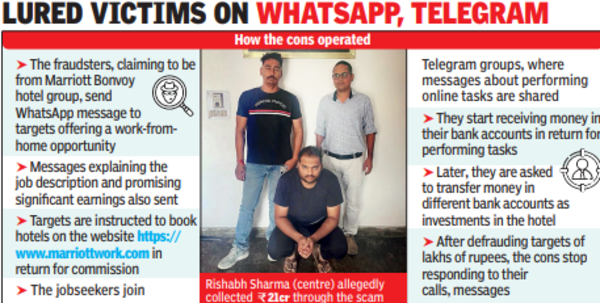Police said Rishabh Sharma of Sector 9 was directly involved in 37 cases of fraud registered in 10 states and provided assistance in 855 others.TOI had earlier reported that a police team from Uttarakhand arrested him on October 28, tracing the bank accounts he had provided to some of his targets to transfer money.
Police are also probing allegations that Rishabh worked for cartels based abroad and routed the money to countries like China, Singapore and Hong Kong through hawala and cryptocurrency. He started carrying out frauds only six months ago and pocketed Rs 21 crore, most of which is believed to have come from the hefty commissions he earned from these international gangs.
“A few years ago, he would sell vegetables and fruits in Faridabad. Like most other businessmen, he incurred massive losses during the pandemic and had to wind up. For the next few months, he took up various WFH offers to sustain his family. He then met an old friend who was already involved in orchestrating online frauds. In just six months, since he started committing frauds, he netted Rs 21 crore,” said Ankush Mishra, DSP (cyber police) in Dehradun.
It was this “friend” who provided Rishabh with a database of phone numbers to make random calls and tips on how to persuade people with job offers. Rishabh’s last victim was a businessman based in Dehradun, who was cheated of Rs 20 lakh.
So, how did he con people?
The 27-year-old, police said, first created a fake website of Marriott Bonvoy — marriottwork.com. It was similar to the original website of the star hotel chain — marriott.com.
On August 4 this year, the businessman received a WhatsApp message for a WFH opportunity. The message offered a part-time job to write reviews for ‘Marriott Bonvoy’ group of hotels.
“Since the offer seemed genuine, I called on the number provided with the message. A man identified himself as Rishabh Sharma, a representative of Marriott Bonvoy. He introduced me to his colleague Sonia, who, he said, was an associate of one of the hotels of the group,” the businessman said in his complaint.
Sonia took on from there. She sent a link to the victim and made him join a Telegram group — MARRIOTT BONVOY® 558. The businessman was asked to write positive reviews for the hotel on the fake website and answer questions from guests, if needed. “I had no reason to believe that the platform on which I was writing reviews was fake. They would themselves pose as guests and send me queries. I, too, would answer them diligently, thinking they were genuine,” he admitted.
What really earned his trust was an initial payment of Rs 10,000. “When they realised I had started to trust them, Sonia proposed an investment plan to me. I was asked to pump in money to develop the website and get a share of the profits,” he told the cops.
Over the next few days, the victim got a second tranche of Rs 10,000 into his ICICI Bank account. With promises of more lucrative returns, the man was lured to invest in parts. In the next one month, he had invested around Rs 20 lakh.
“Every time I would ask for returns, they would persuade me to invest more, saying the profits could run into a crore. After a while, they stopped responding to my calls and messages and switched off the numbers. I had already invested Rs 20 lakh by then,” the businessman said.
An FIR was registered at the cybercrime police station of Dehradun for cheating and criminal conspiracy and under provisions of the IT Act on October 4.
“We traced the bank account details and found he was based in Gurgaon. He would randomly call up people and send them messages. Those who responded to them were tricked into the investment scam,” Mishra told TOI over phone from Dehradun.
Police said many online frauds that sought to target people with WFH offers, YouTube ‘likes’ and other such schemes had links with gangs in China, Hong Kong, Dubai, and Singapore. These gangs usually employ “agents” in India to open multiple bank accounts where the stolen money can be parked initially. They are then routed to these countries through hawala and cryptocurrency.
“In Rishabh’s case, for instance, we found that the money had been sent to China in the form of crypto. He was an agent of one of the international gangs. Usually, these agents don’t have any information on the actual mastermind. We are trying to find out more in any case,” Mishra said.
After Rishabh was arrested, police cross-checked his details with a database of the home ministry. After a cybercrime is reported through the 1930 emergency number, details of the case — like the bank account used to transfer money, the number used to make phone calls and the IMEI numbers of the phones — are automatically updated on the database. This initiative is called 14C.
“It is important for police to cross-check the details with the ministry’s records. In Rishabh’s case, we found he was involved in carrying out frauds in at least 10 states, including Gujarat, Punjab, Delhi- NCR, Telangana, Maharashtra, UP, Delhi, Karnataka and Bihar,” the DSP said.
